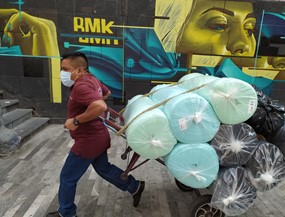My friend Noe Zúñiga, 34, works as a private driver and sells winter garments outside the Tacuba Metro station, one of Mexico City’s busiest interchanges. Like many other Mexicans, he works in the informal economy.
On March 30, 2020, the General Health Council of the Mexican Government published an Official Decree declaring a Health Emergency and epidemic caused by the SARS-CoV2 (COVID-19). This immediately resulted in the closure of all essential and nonessential activities of the economy. Non-essential activities had to stop and although the quarantine was not total, nor as strict as in other countries, it deeply impacted the labour market.
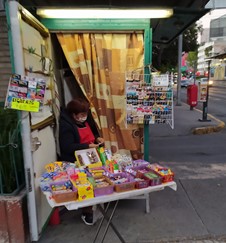
When I returned to Mexico City for a visit in October 2020, Noé told me that he and his fellow vendors in the outdoor market were told to shut down completely and stop selling. He has always been involved in this business in one way or another since his childhood and nothing like this had ever happened before. His stories on Instagram changed to document his overnight patrols of the street market stalls. Maintaining a security presence to guard his own goods and those of his neighbours suddenly took priority over selling. He spent several nights there patrolling through the most difficult early weeks of the pandemic in March and April.
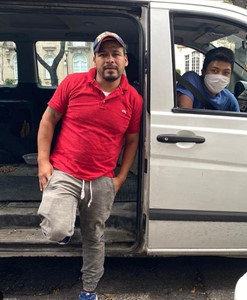
According to Noé, he and his fellow vendors in the outdoor market were asked to shut completely and stop selling. This was something he had never seen before as he has always been involved in this business in one way or another since his childhood. His stories on Instagram switched to his overnight patrols of the street stands. Maintaining a security presence for his own goods and for his neighbors suddenly took priority over selling. He spent several nights there patrolling through the most difficult early weeks of the pandemic in March and April.
Noé told me that during the pandemic his earnings from the outdoor stall stopped completely. He found temporary employment stitching clothes labels that would then be sent overseas. For completing 20,000 labels he would earn about MXN150.00 (£7) a day, not enough to cover his daily expenses and barely enough to get survive on.
With a little help from my friends
The help of friends and family with whom Noé shares a house or vecindad1)The dwellers form a complex communal unit with a varied array of social interrelationships, not unlike tenements in pre-war Britain or conventillos in Chile. was crucial. Noé was not the only one affected, and neighbours would very often cook for everyone or share food. Noé thinks that it was deeply unfair that the government obliged small businesses to stop trading while international chains such as Walt-Mart were able to stay open, leaving most of the active working population unprotected.
Noé’s wife, Carmen (not her real name) has been looking after the family and the house.Her role in the family is like that of many other Mexican women. Mexico continues to hold second to last place in the ranking of female labour-market inclusion in Latin America and the Caribbean, with 45.4 per cent of women are active (in formal and informal activity) compared with 77 per cent of men.
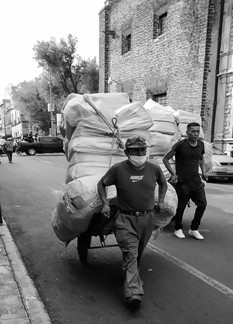
But more complex Mexican reality makes these numbers less reliable. Many labour force statistics will show women as ‘inactive’, when they play crucial roles in the care economy. Others moonlight in the tianguis2)A tianguis is an open-air market that is traditionally held on certain market days in a town or city neighborhood in Mexico and Central America., or simply help male or female owners of informal businesses, performing essential tasks, but not receiving the benefits of formal employment.
A most recent report on the impact of COVID19 on labour in Mexico by the ILO showed that during the pandemic, informal employment fell to 47.7 per cent. This represents a historic decline, but it was caused not by the formalisation of jobs, but by a significant loss of informal work. As of August, the rate had risen again almost to pre-pandemic levels and by year-end it may have surpassed them as more unemployed formal workers found places for themselves in the informal economy.
Deceptively low official rates
Mexico’s official unemployment rate is quite low – 3.48 per cent in 2019. But in contrast to most neo-liberal economies, many otherwise active informal workers have very little access to any kind of social protection. The under-utilised labour force is loaded with the underemployed.
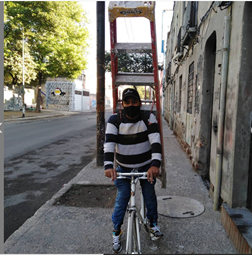
The ILO’s World Social Protection Report 2017-2019 showed that Mexico, at 50.3 per cent is just above 45.2 per cent world average for effective coverage of social protection. The average for the rest of Latin America and the Caribbean is 61.4 per cent.The UK has an effective coverage of above 95 per cent.
According to the ILO, in the first quarter of 2020 (before the COVID19 pandemic began) the labour informality rate represented 56% of the working population of Mexico, some 31.3 million people, who are not covered by any labour legislation and have limited or no access to legal mechanisms of employment or social protection. Such is the case of my friend Noé.
Government measures for the pandemic economy
Among official measures implemented by the Mexican government to protect business and workers during the COVID19 pandemic, we can summarize the following:
- The Government recommended that employers maintain the full salary of their workers, whenever possible.
- The National Fund for the Consumers (FONACOT) granted 300,000 loans of MXN10,000 eacj (£370) to employees holding formal contracts who have been employed for at least one year.
- 3 million loans of MXN25,000 (£925) to formal and informal business. For registered businesses, the requirement is to have been ‘supportive’ and have not laid off workers or lowered salaries in the last year (Financial Support to Family Business). According to the Economic Census of 2019, there were 4.1 million micro, small and medium-sized businesses in Mexico in 2019.
- The Mexico City Government announced that its Unemployment Insurance Program was being expanded to more beneficiaries through a program of ‘Support for residents of Mexico City who lost their formal employment during the emergency derived from sars-cov2 (covid-19)’. This consists of a monthly grant of MXN3,000 (£111) to all who lost a formal-sector job, and an “Emergent Support to Resident Non-Salaried Workers” of MXN1,500 (£55) for two months. Noé applied to this support in mid-2020 and submitted all his applications. In March 2021 he has still not received any response.
It is in these circumstances that millions of workers such as Noé Zúñiga have to endure this unprecedented crisis. The ILO predicts for Mexico:
- An 11.7 per cent unemployment rate by the end of 2020, equivalent to approximately 6 million people.
- 44 per cent of the employed population in Mexico face the risk of reduced hours or wages. In some sectors, this overlaps with vulnerability of informality and low income.
Despite all, Noé enjoys life and the company of his family, I often see social media posts of him visiting green spaces outside the capital or riding his bike in the city and I know that despite the gloomy economic prospects he enjoys his life in Mexico City where the complex array of social relationships provides people with informal support.
All photos: Noé Zúñiga and Alejandro Reyna / @.itz.coatl.
References
| ↑1 | The dwellers form a complex communal unit with a varied array of social interrelationships, not unlike tenements in pre-war Britain or conventillos in Chile. |
|---|---|
| ↑2 | A tianguis is an open-air market that is traditionally held on certain market days in a town or city neighborhood in Mexico and Central America. |

